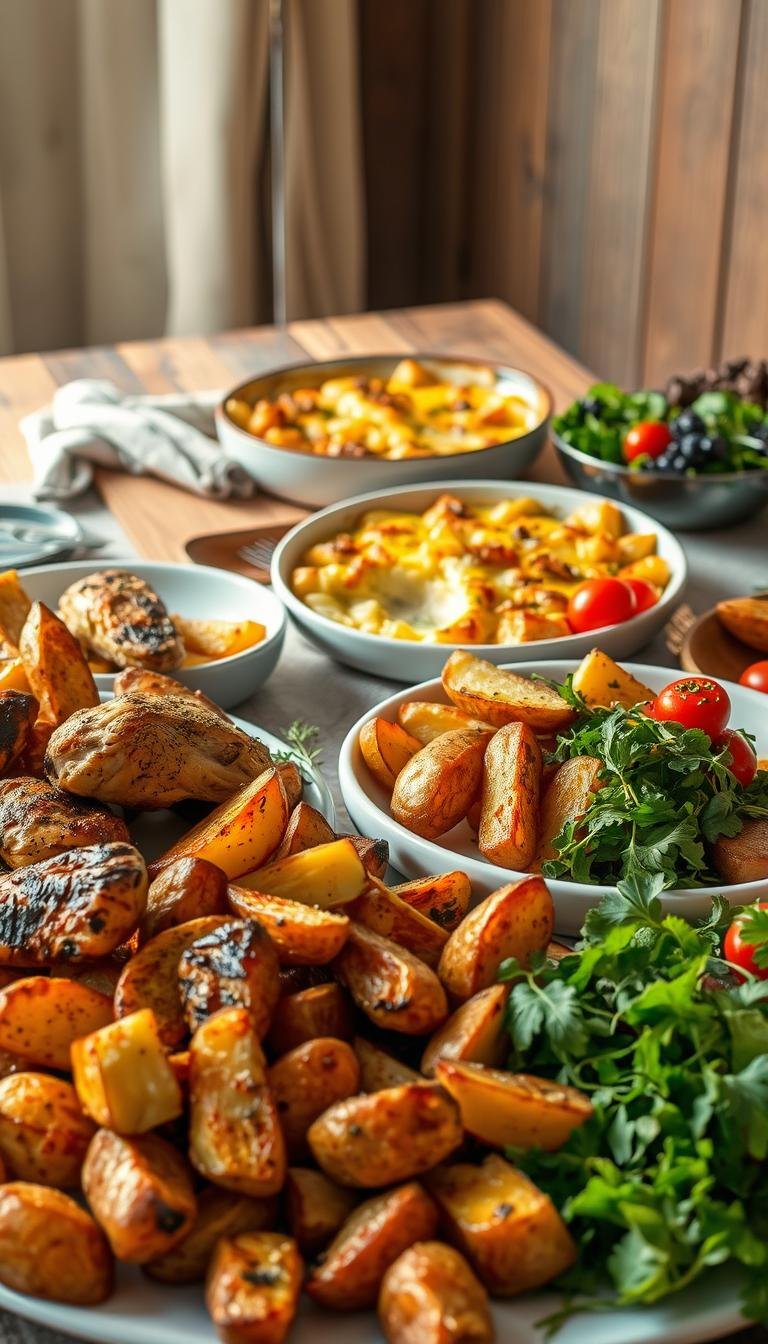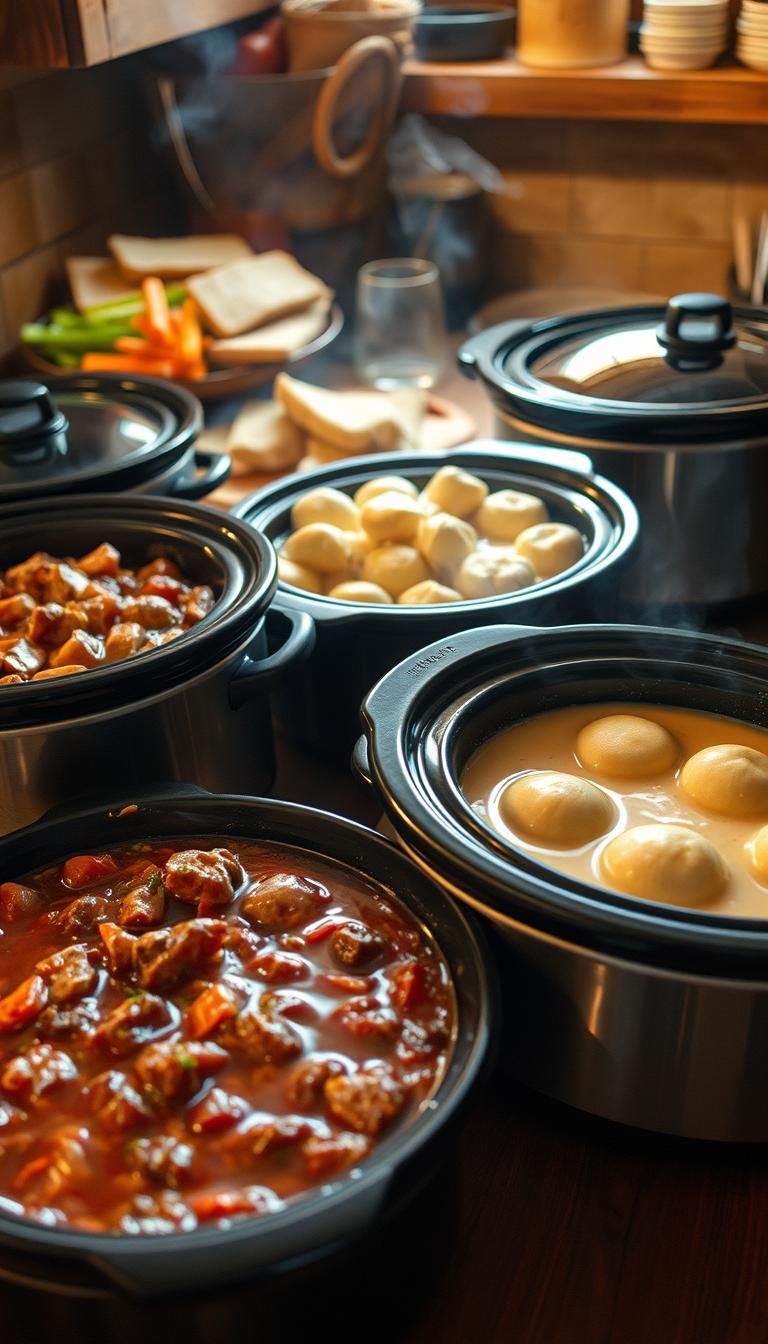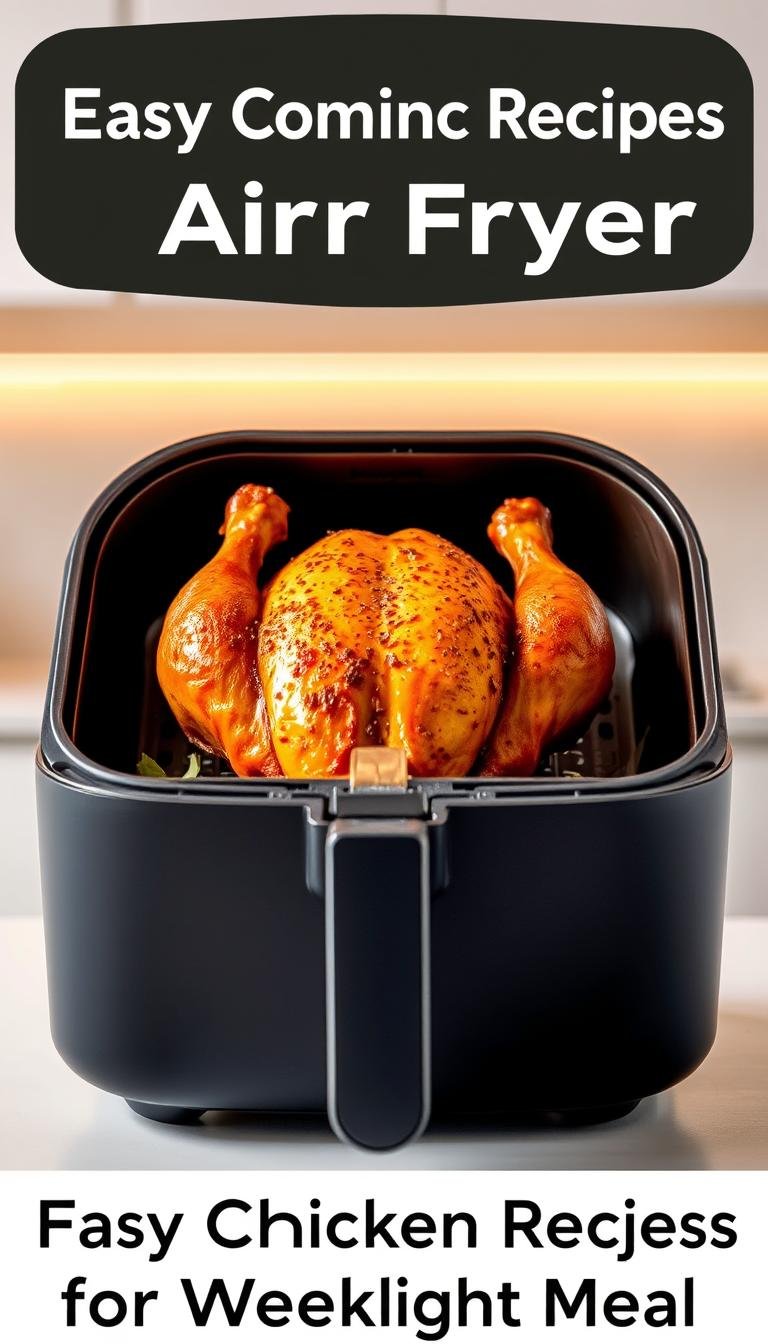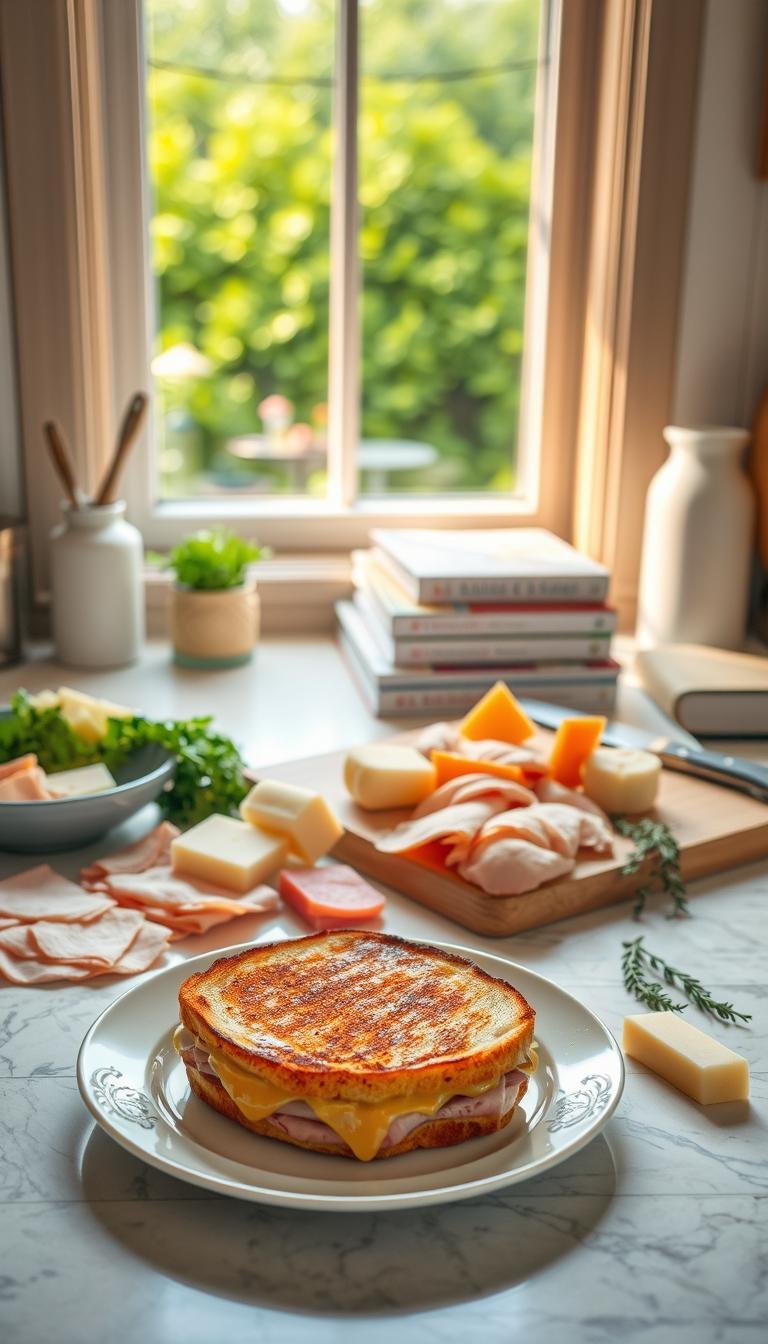Top Dinner Ideas with Potatoes for a Tasty Meal
Surprising fact: a single tuber can feed a family and cost less per serving than many staples — that one spud stretches budgets and tastes far more than you expect.
This Website contains affiliate links. That means I may earn a small commission if you purchase through my links, at no extra cost to you.
This curated list helps you plan affordable, satisfying meals that scale from weeknight plates to a table full for guests. Potatoes are naturally gluten-free, hold well in the pantry, and pair easily with proteins and vegetables.
Expect options for one-pan dinners, sheet pans, skillets, casseroles, soups, salads, and baked versions so you can pick a recipe that fits time and pantry limits.
What you’ll find: techniques and pairings, oven, stove, air-fry and slow-cook methods, and simple swaps for gluten-free, dairy-free, or vegan needs. Many recipes prep ahead, reheat well, and turn into smart lunches to cut waste.
Key Takeaways
- Potatoes are budget-friendly, versatile, and nutrient-dense.
- The list covers fast weeknights and larger table gatherings.
- Includes oven, stove, air-fryer, and slow-cooker techniques.
- Recipes offer dietary-friendly swaps and prep-ahead tips.
- Pairings and quick wins help you pick the right recipe fast.
Why Potatoes Make the Best Weeknight Dinners
Fast-cooking and forgiving, potatoes turn pantry staples into satisfying plates with little fuss.
Speed and ease: Dice and sauté, roast a tray, or let cubes simmer in a soup for a quick meal after a long day. These methods save time and clean-up so you can relax sooner.
Value and storage: Affordable and shelf-stable, they keep for weeks when stored cool and dark. Buy on sale, batch-cook, and you’ll cut grocery runs and weekly planning stress.
Flavor and flexibility: A potato soaks up spices, herbs, and sauces, changing the taste profile of dishes while using the same base ingredient.
| Advantage | How it helps | Best method |
|---|---|---|
| Nutrition | Fiber, potassium, B6 and C add fullness | Boil, roast, mash |
| Batch cooking | Repurpose for breakfasts, salads, casseroles | Roast extra or boil in bulk |
| Reliability | Hold texture in stews and bakes | Choose firm varieties and proper timing |
Practical tip: Roast or boil extras at the start of the week to speed up nights and reduce food waste. Packed with comfort, they make a busy week feel manageable.
Know Your Spuds: Russet, Red, Yellow, Fingerling, Purple, and Sweet Potatoes
Different potato types give predictable results—crispy edges, fluffy centers, or firm cubes—when you match them to a method.
Russets have rough brown skin and a fluffy interior. They are ideal for baking, frying, classic fries, and airy mashed bases that support toppings.
Reds and yellows have thin skins and hold their shape. Use them for roasting, boiling, and potato salads where firm cubes matter. Leaving the skin on saves time and adds texture.
Fingerlings are small and creamy. Roast or pan-fry them whole for even cooking. Purple varieties keep color and firmness, great for composed plates and colorful salads.
Sweet potatoes bring natural sweetness and moisture; they shine roasted, mashed, or as fries in a bowl-style recipe. Note that true yams are drier and nuttier and are less common in US stores.
“Match starch level and skin thickness to the technique for consistent results every time.”
- Russet = baking, mashing.
- Red/Yellow/Fingerling = roasting, salads.
- Purple = color and firm texture.
- Sweet potato = chilis, bowls, and sweeter dishes.
Foundational Cooking Methods for Maximum Flavor
Basic cooking methods unlock deep flavor and let you adapt a simple spud to many meals.
Boil and Mash
Start cold in salted water so cubes cook evenly. Simmer until tender, drain well, and dry briefly to improve texture.
For mashed potatoes, warm your butter or oil and milk before stirring. Stir gently—overworking makes gluey mash. Add roasted garlic for depth.
Roast and Bake
Roasting needs high heat, generous oil, and space between pieces to brown instead of steam. This suits red, yellow, and fingerling varieties.
For baked potatoes, prick the skin, rub oil and salt, then bake until crackly for fluffy centers—ideal for a toppings bar.
Fry, Air Fry, and Microwave Shortcuts
Deep or pan frying gives a crisp shell and tender core. An air fryer cuts oil and cleanup but keeps crunch for wedges and fries.
Microwave to par-cook, then finish in a hot pan or the oven to save time without losing flavor.
- Texture tips: cut evenly, preheat pans, and dry boiled pieces before roasting.
- Seasoning: salt early, layer herbs, and finish with garlic-infused oil for punch.
- Flexibility: use any method interchangeably to stretch one prep into multiple meals.
Dinner Ideas with Potatoes: The Ultimate List
Quick picks to match time and cleanup
Use this compact list to pick a meal path fast. Each category offers reliable staples and fresh takes so you can rotate recipes without repeating the same plate every week.
- One-pan / sheet pan: fast prep, minimal cleanup, great for roasting veggies and protein together.
- Skillet: quick browning and bold flavor; works well for hash-style meals using pre-cubed or frozen bases.
- Casserole: batch-friendly and budget-wise; makes extra to serve for lunches and freezes well.
- Soup: comforting, stretchable, and perfect for combining pantry staples to bulk up a pot.
- Salad / bowl: roast cubes under a herby topping for color and texture on the table.
Time savers include par-cooking, frozen hash brown mixes, and pre-cut spuds. These cuts speed prep and help you finish a meal on busy nights.
Dietary flexibility: swap dairy, use gluten-free toppings, or make a vegetarian base to suit your household. Bookmark favorite combos and build a weekly rotation around these dependable paths.
One-Pan and Sheet Pan Potato Dinners for Busy Nights
A single tray can yield a full meal in 30–40 minutes when you pace ingredients by cook time.
Parmesan-crusted sheet pan chicken and cheesy potatoes
Parmesan forms a savory crust on halved potatoes while bone-in or skin-on chicken roasts nearby.
Toss potato wedges in oil, salt, cracked black pepper, and herbs. Start the potatoes first, then add chicken so both finish at the same time.
Sheet pan balsamic chicken with bacon potatoes and Brussels sprouts
The sweet balsamic glaze balances smoky bacon and caramelized sprouts for a tray that feels elevated but stays simple.
Layer sturdy items and stagger placement. That keeps edges crisp and centers tender. Finish hot from the oven and spoon extra glaze over the chicken.
Pierogi and kielbasa sheet pan dinner
Use frozen pierogi and sliced kielbasa directly on the sheet pan—no boiling needed. Add halved baby potatoes or roasted peppers for color.
Preheat the pan in the oven to boost browning, space pieces to avoid steaming, and flip halfway. Double the batch for easy lunches and garnish with parsley or extra grated parmesan.
Comforting Potato Casseroles the Whole Family Will Love
Warm, layered bakes bring familiar flavors and easy prep to weeknight tables.
Sausage and potato casserole is creamy and cheesy, where savory sausage enriches a creamy base and tender potatoes finish soft and flavorful.
Savory, scaled classics
Twice-baked potato casserole turns fluffy scooped centers into a mixed bake. Stir in bacon or chives, top with melted cheese, and serve straight from the dish.
Chicken broccoli potato casserole pairs broccoli, chicken sausage, and cheddar for a lighter-feeling bake. It scales easily and offers gluten-free or dairy-free swaps.
Reuben casserole layers hash browns, corned beef, sauerkraut, and rye croutons for a deli-style spin. Crisp tops and tangy filling make it memorable.
- Feeds a family, travels well, and reheats cleanly for lunches.
- Assemble in the morning and bake 35–45 minutes at 375°F.
- Swap sausages, add extra greens, or trade cheeses to suit tastes.
Serving tip: balance richness with a crisp salad or steamed veg to round out the plate at dinner time.
Skillet Suppers: Potato Skillet, Sausage, and Easy One-Pan Meals
A hot pan makes quick work of starch, protein, and veg for a fast, satisfying plate.
Sausage, Peppers, and Potatoes
Start by browning the sausage to build a base of savory fat. Remove and set aside.
Sauté sliced peppers and onions in the same skillet until they soften. Return the meat, add halved new potatoes, and stir to coat.
Season with smoked paprika or Italian herb blend. Use a lid to steam until potatoes are tender, then remove the lid to crisp edges.
Beefy Potato Skillet & One-Pot Cheesy Version
Brown ground beef and drain excess fat. Toss in diced potatoes and cook until they begin to brown.
For the cheesy finish, sprinkle grated cheese, cover briefly to melt, then serve hot. For a dairy-free plate, skip the cheese or swap vegan melt.
- Timing tip: par-cook larger potatoes to match protein cook time.
- Flavor build: brown protein first, add aromatics, then starch.
- Bulk up: toss in zucchini or spinach near the end for color and nutrients.
- Make-ahead: cook extra and reheat in a skillet for hearty lunch bowls.
Soups and Chilis with Potatoes for Cozy Evenings
Warm bowls of soup and hearty chilis bring a simple, stick-to-the-ribs finish to cool evenings.
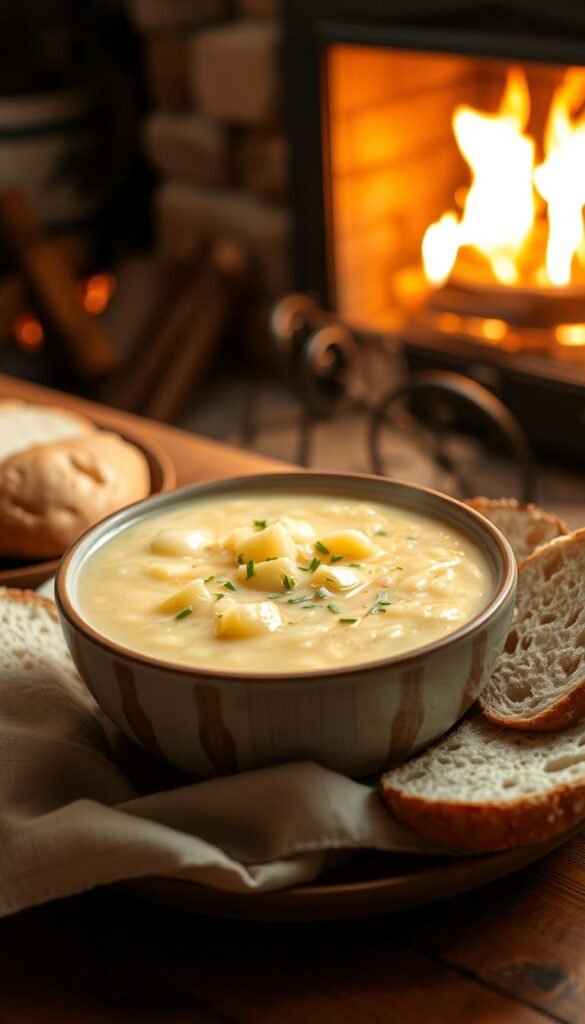
Ham and Potato Soup
Use leftover holiday ham to make a fast, comforting bowl. Cube potatoes and simmer with aromatics, bay leaves, and thyme.
Finish by stirring in a splash of milk or a small blended portion of the pot to thicken without heavy cream. Top servings with green onions or shredded cheese.
Lentil Potato Soup
Plant-based and budget-friendly: brown onion, add lentils, diced potato, and tomatoes. Season with cumin and a bay leaf.
Simmer until lentils and potatoes are tender. Mash a few pieces against the side of the pot to make a thicker, silky texture without dairy.
Sweet Potato Chili
Meatless and hearty: layer sweet potato, beans, chili powder, and smoked paprika for deep flavor. Add a touch of cumin for warmth.
For slow-cooker ease, combine ingredients in the morning and cook low 6–8 hours. Serve with a dollop of yogurt, cilantro, or grated cheese.
Seasoning tips: try thyme, bay, or chili powder to steer profiles from classic to spicy. To thicken, blend part of the soup, mash some potato, or let it reduce on low heat.
Mashed & Roasted Potatoes That Double as Dinner Sides or Mains
Creamy mashes and crackly roasted pieces turn simple tubers into standout sides or even a full plate when topped smartly.
Garlic herb mashed potatoes and dairy-free mashed potatoes
Garlic herb mashed potatoes are rich, buttery, and savory. Use warm butter and warm milk to blend for a silky finish.
Dairy-free mashed potatoes swap oat milk and vegan butter and can be ready in about 15 minutes. Heat liquids before adding and stir gently to avoid gluey texture.
Crispy baked parmesan potato
Crispy baked parmesan potato cubes lean into cacio e pepe vibes. Toss chunks in olive oil, grated parmesan, cracked black pepper, and a hint of garlic, then roast at high heat until edges brown.
Roasted sweet potatoes with honey yogurt sauce
Roasted sweet potatoes wear a tangy honey-yogurt drizzle well. Roast until caramelized, then finish with a spoon of yogurt sauce and fresh herbs for sweet-savory balance.
- Compare: classic garlic mash vs. fast dairy-free—both offer comfort and texture.
- Timing tip: warm liquids and minimal stirring yield ultra-smooth mashed.
- Finish mashed with olive oil or chives; toss roasted pieces in fresh herbs for aroma.
- Turn any side into a main by topping with sautéed greens, leftover protein, or a fried egg.
- Reheat mashed gently with a splash of milk; re-crisp roasted pieces in a hot oven or air fryer.
Baked Potatoes and Toppings Bar: From Classic to Creative
A simple baked potato becomes a crowd-pleaser when you offer a spread of bright and savory toppings.
Set a toppings bar at the table so guests customize their plates. Offer classics and a few bold options to keep the station lively and easy to scale for groups.
Loaded gluten-free baked potato
Make cores ahead by baking or air-frying several large spuds. For a gluten-free loaded option, top them with beans, sautéed greens, avocado, and a tangy dairy-free yogurt or herbed olive oil.
Meal-prep tip: bake extras early in the week, cool, and refrigerate. Reheat and add toppings for a quick lunch or evening plate.
BLT baked potato
Use crisp bacon and chopped romaine for texture. Dress the salad mix in buttermilk dressing and spoon it over a split, hot potato. A scatter of chives brightens each bite.
Pepperoni pizza stuffed potatoes & air fryer finish
Hollow baked potatoes slightly and stuff with pizza sauce, sliced pepperoni, and shredded cheese. Return to heat until melted and bubbling for a kid-approved, game-night-friendly treat.
For a fast baked potato recipe, try the air fryer: it gives a crispy skin and fluffy center without using the oven. Par-cook in the microwave, then crisp in the air fryer if you need speed.
- Keep classics: sour cream, shredded cheese, and bacon.
- Offer dairy-free swaps: herbed olive oil, dairy-free yogurt, or salsa.
- Let guests build at the table for an interactive experience.
- Add a simple salad or roasted vegetables to round out the plate.
| Method | Time | Texture | Best use |
|---|---|---|---|
| Oven bake | 45–60 min | Crackly skin, fluffy center | Large batches, buffet |
| Air fryer | 30–40 min | Crispy skin, quick finish | Small batches, hot kitchens |
| Microwave + finish | 10–20 min | Soft center, needs crisping | Prep fast, then crisp in pan or air fryer |
Sweet Potato Dinners Packed with Flavor
A few smart swaps and layered seasonings turn sweet tubers into fast, memorable meals.
One-pan sweet potato skillet: cube sweet potatoes evenly and pan-sear over medium-high heat to get crisp edges in under 30 minutes. Start aromatics—onion, garlic, and a pinch of smoked paprika—then add the cubes and toss until browned. This gluten-free, nut-free skillet is a fast weeknight winner and cleans up easily.
Chicken potato curry: build flavor by blooming spices and lemongrass, then add coconut milk and chunks of sweet potato. A spoon of miso or a curry paste lifts umami; simmer until the cubes hold their shape but are tender. This gluten- and dairy-free recipe tastes takeout-level and stores well for lunches.
Spinach salad with roasted chickpeas and sweet potato: roast cubes until caramelized, then toss with baby spinach, roasted chickpeas, and optional chicken sausage for protein. Finish with lemon, fresh herbs, and a drizzle of olive oil.
Timing tip: cut cubes to about 1/2–3/4 inch so they cook evenly in skillets, curries, or salads. Batch roast extras to use later in bowls, tacos, or breakfast hashes. All three options highlight layered aromatics and finishing herbs for big flavor and easy weeknight appeal.
Breakfast-for-Dinner: Hash Browns, Eggs, and Potato Favorites
Turn late nights into simple, cozy meals by centering plates on roasted or pan-seared tubers and a runny egg.
Egg and potato skillet
Fast and complete: an egg and potato skillet comes together in under 30 minutes. Crisp edges, tender centers, and a sprinkle of smoked paprika make it feel special.
Add torn greens at the end and top a soft yolk for richness.
Crispy oven-baked breakfast potatoes
Roast small cubes until golden and toss them with scallions and hot sauce. Serve with eggs and sausage or prosciutto for a protein-forward plate.
Gluten-free hash brown casserole
This make-ahead recipe uses hash browns, eggs, milk, and cheese. Assemble, chill, and bake when ready—it reheats beautifully for crowds.
High-protein breakfast bowl
Layer roasted potato, sautéed greens, prosciutto, and a poached egg. It’s gluten-free, nut-free, and can be dairy-free by swapping the cheese.
“Bake extra potatoes early in the week to speed up plates and save time.”
- Seasoning tips: paprika, scallions, and hot sauce.
- Meal-prep tip: portion roasted spuds into bowls and add a soft-cooked egg at serving.
Family-Friendly Potato Recipes That Kids Devour
Easy comforts like tater-tot bakes and stuffed spuds keep weeknight stress low and smiles high.
Loaded Chicken and Tater Tots pairs crispy chicken and tots for a hands-on plate the whole family asks for. Mild seasoning and a blanket of melty cheese make it a reliable hit that feels special but cooks fast.
Try Pepperoni Pizza Stuffed Potatoes when kids want something familiar. Hollowed spuds become handheld pizzas that are fun to top at the table and work well for packed lunches later in the week.
Slip veg into sauces or toppings—spinach, diced peppers, or finely grated carrots hide nutrition without changing flavor. Serve finger-food formats like wedges, tots, or mini cups to boost engagement.
- Batch-cook bases and reheat to save time.
- Let kids pick toppings to build family love and fewer refusals.
- Re-crisp in a hot oven or air fryer to restore crunch.
| Format | Kid Appeal | Prep Time | Best tip |
|---|---|---|---|
| Tater-tot bake | High | 30–40 min | Use mild spices, add shredded veg |
| Stuffed potato | High | 30–45 min | Let kids top at serving |
| Wedges / tots | Very high | 20–30 min | Air-fry to keep crisp |
Air Fryer Wins: Fries, Wedges, and Speedy Potato Sides
Air frying turns basic wedges and fries into crisp, fast sides that need little oil or fuss.
Timing & temp: For thin fries, cook 12–15 minutes at 400°F; for wedges, 18–22 minutes at 390°F. Shake or flip halfway so outsides brown and insides stay tender.
Prep tips: Soak cut pieces 20–30 minutes to remove surface starch, then dry completely. Par-cook thicker cubes for 5 minutes to shorten final crisping time.
Seasoning strategy: Salt lightly before cooking and finish with fresh herbs or spice blends for pop. A light spray of oil helps browning without deep frying.
- Try batch air-frying for meal prep; reheat in the basket to retain crunch.
- For an oven-free option, use an air fryer baked potato recipe: prick, rub oil and salt, and cook 35–40 minutes at 375°F for a crisp skin and fluffy center.
- Do not overcrowd the basket—work in single layers and shake mid-cook for even browning.
Pairing: Serve air-fried sides alongside grilled proteins or toss them into salads and bowls to turn a side into a filling plate. This approach keeps cleanup minimal and flavor high while making perfect batches each time.
Potato Salads and Bowls That Eat Like a Meal
A well-built bowl starring roasted or chilled potato pieces gives you a filling, portable plate for any night of the week.
Jalapeño popper potato salad
Heat and crunch: toss cubed spuds with pickled jalapeños, crispy bacon, and shredded cheddar for a pop of flavor.
Use a light mayo-yogurt blend to bind the mix and add chopped scallions for brightness. This potato salad channels cookout energy but finishes fast.
Chicken BBQ salad with potato wedges
Weeknight-friendly: pair warm potato wedges and greens, then top with sliced BBQ chicken for a meal-prep ready plate.
Serve wedges warm so they contrast with crunchy lettuce. Drizzle a tangy BBQ-ranch dressing for balance and pack components separately for lunches.
Buffalo chicken Caesar salad with roasted potatoes
Build a hearty Caesar by swapping croutons for roasted cubes, then add gluten-free crispy chicken tenders, red onion, and turkey bacon.
Taste tip: toss arugula in a light Caesar dressing and finish with a squeeze of lemon to cut richness.
Make-ahead strategies: keep dressings in jars, roast potatoes until just tender, and assemble at serving to keep greens crisp. For seasonal swaps, add corn or roasted squash to update the dish across the year.
Global-Inspired Potato Dinners: Greek, Mexican, and More
Bright herbs, warm spices, and layered sauces show how a simple tuber adapts to many cuisines.
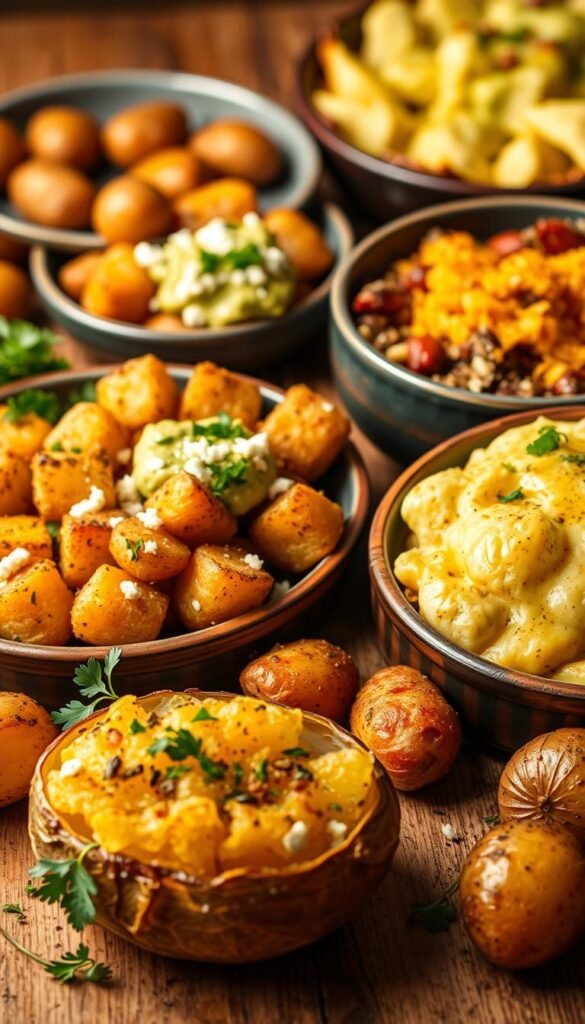
Try global riffs that keep prep straightforward and flavors bold. Below are three easy paths that scale for meal prep or a special meal.
One-pan Greek baked chicken and potatoes
Use a sheet pan to roast lemon, oregano, and garlic over halved potatoes and bone-in chicken. Cook about 30–40 minutes so the skin crisps and centers stay tender.
Garnish with crumbled feta and olives for a bright finish.
Cheesy enchilada potatoes
Layer crispy potato pieces, shredded chicken, enchilada sauce, and grated cheese for an easy casserole. Bake until bubbling and top with cilantro and jalapeño for contrast.
Moussaka-inspired layered bake
Layer thinly sliced potato beneath eggplant and seasoned beef, then pour on a silky béchamel. This rich casserole turns the tuber into a sturdy, elegant base.
- Seasoning frameworks: oregano and garlic for Greek; chili and cumin for enchilada.
- Timing tip: start potatoes earlier so the pan cooks evenly without drying the protein.
Make-Ahead, Meal Prep, and Budget Tips for Potato Dinners
Plan one cooking session that gives you ready-to-use roasted spuds for several quick plates across the week.
Stock smart: buy extra when prices fall and store tubers in a cool, dark, airy spot. This extends shelf life and cuts weekly grocery costs.
Batch cook on Sunday: roast or boil a full sheet pan or pot. Cool pieces quickly, then portion for salads, hashes, bowls, and casseroles.
Fridge & freezer strategy: refrigerate cooked portions 4–5 days. Mash and casseroles freeze best for 2–3 months; roasted cubes lose some crisp but re-crisp well in an oven or air fryer.
Use prepped spuds to speed a busy week. Warm cubes in a hot pan, toss with sauces, or top them with quick proteins for a fast meal that tastes fresh.
- Build a weekly plan around one base: roasted potatoes, boiled cubes, or mashed batch.
- Rotate proteins and sauces: grilled chicken + chimichurri, sausage + mustard cream, or beans + salsa verde.
- Label containers with date and use frozen items within 2–3 months for best quality.
| Item | Storage | Best for | Reheat tip |
|---|---|---|---|
| Roasted cubes | Fridge 4–5 days; freeze 2–3 months | Bowls, salads, skillet crisp | Air fry or oven 8–12 min for crisp edges |
| Boiled cubes | Fridge 4–5 days; not ideal for freezing whole | Salads, soups, casseroles | Gently reheat in simmering broth or skillet |
| Mash / casseroles | Fridge 4–5 days; freeze 2–3 months | Make-ahead meals, reheatable mains | Bake covered then uncover to brown top |
“Batch cook once, reinvent many times—small swaps in protein or sauce keep meals new and waste low.”
Smart Storage: Keep Potatoes Fresh and Leftovers Safe
Good storage keeps flavor and texture steady so cooked meals taste their best across the week.
Uncooked: cool, dark, and breathable
Store whole potatoes in a cool, dark, airy place to prevent sprouting and greening. Light exposure makes them bitter and changes texture.
Use mesh or paper bags, or an open basket, so air circulates and moisture does not collect. Avoid plastic bags or sealed bins that trap humidity.
Do not refrigerate raw tubers. Cold turns starch to sugar and alters how they brown when cooked.
Cooked: refrigerate promptly and freeze smartly
Cool leftovers quickly, then refrigerate in airtight containers. Eat refrigerated cooked potato portions within 3–4 days for safety and quality.
Mashed and casserole formats freeze especially well. Portion into labeled containers, date them, and freeze. These keep best up to a year but aim to use them sooner for peak flavor.
- Label containers with contents and date for easy meal planning.
- Portion before freezing to speed thaw-and-reheat nights.
- Reheat thoroughly until steaming hot and check texture—especially for browns and mash—before serving.
“Batch-cook once, store smart, and you’ll save time and reduce waste.”
Conclusion
A few smart potato recipes can turn pantry staples into memorable, budget-friendly plates. They adapt across sheet pans, skillets, casseroles, soups, salads, and baked bars to suit any pace or flavor profile.
Pick two or three potato recipes to anchor your next meal plan and batch-cook on a slow afternoon. Rotate categories — sheet pan, skillet, casserole, soup, salad, and baked — to keep menus fresh without extra effort. Revisit storage and prep tips so cooked portions stay tasty and waste drops.
These reliable, adaptable spuds invite customization and bring people together at the table. Keep a few trusty methods on hand and enjoy a simple, satisfying dinner that stretches both budget and flavor while creating real family love.
